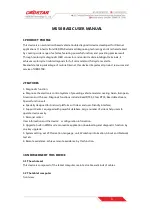
USE AND MAINTENANCE
ENGLISH
28
cod. F07011399
2.0 SAFETY REGULATIONS AND
ACCIDENT PREVENTION
Pay attention to danger signs, where shown, in this booklet.
There are three levels of danger signs:
DANGER
: This sign warns that the operations described
cause
serious lesions, death or long term health risks, if they are not
carried out correctly.
ATTENTION:
This sign warns that the operations described
could
cause
serious lesions, death or long term health risks, if they are
not carried out correctly.
CAUTION:
This sign warns that the operations described
could
cause
serious damage to the machine. If they are not carried out
correctly.
Carefully read all the instructions before using the machine; if
in doubt, contact the technicians of the Manufacturer’s dealer.
The manufacturer declines all responsibility for the non-
observance of the safety and accident prevention regulations
described below.
General norms
1) Pay close attention to the danger signs in this manual and on
the machine.
2) The labels with the instructions attached to the machine give
abbreviated advice for avoiding accidents.
3) Scrupulously observe, with the help of the instructions, the
safety and accident prevention regulations.
4) Avoid touching the moving parts in any way whatsoever.
5) Any work on and adjustment to the machine must always be
done with the engine switched off and the tractor blocked.
6) People or animals must not, under any circumstances be
transported on the equipment.
7) It is strictly prohibited to drive the tractor, or allow it to be driven,
with the equipment attached by persons not in possession of
a driver’s license, inexpert or in poor conditions of health.
8) Before starting the tractor and the equipment, check that all
safety devices for transport and use are in perfect working order.
9) Before starting up the equipment, check the area surrounding
the machine to ensure that there are no people, especially
children or pets, nearby, and ensure that you have excellent
visibility.
10) Use suitable clothing. Avoid loose clothing or garments with
parts that could in any way get caught in the rotating or moving
parts of the machine.
11) Before starting work, familiarize yourself with the control devices
and their functions.
12) Only start working with the equipment if all the protective
devices are in perfect condition, installed and in the safe
position.
13) It is absolutely prohibited to stand within the machine’s radius
of action where there are moving parts.
14) Before leaving the tractor, lower the equipment hooked to the
lifting unit, stop the engine, pull the hand brake and remove
the key from the dashboard, make sure that the chemical
substances are safely out of reach.
15) The driver’s seat must never be left when the tractor’s engine
is running.
16) Before using the equipment check that the support legs have
been lifted; check that the equipment has been correctly
assembled and adjusted; check that the machine is in perfect
order, and that all the parts subject to wear and deterioration
are in working order.
17) Before releasing the equipment from the tractor, put the hoist
command lever in the locked position and lower the support
legs.
18) Only operate when visibility is good.
19) All operations must be carried out by expert personnel, equipped
with protective gloves, in a clean and dust-free environment.
20) Always wear garments that protect the body, without any loose
hanging parts that could become entangled in the moving
parts. Also remove watches, rings, necklaces etc. for the same
reason. Keep long hair tied back and contained in special caps
or similar headgear.
The signs relative to the Personal Protection Devices to be
either worn or kept close at hand when necessary are shown
below:
Tractor hitch
Before hitching the equipment to the tractor, the operator should
always pull the parking brake and put the tractor in neutral.
If the tractor has a hydraulic hitching system and if the operation
is being performed by two operators, the connection of the third
point of the equipment could generate a potential risk.
The hitching operation must always be carried out by one operator
only, following the procedure described below:
-
Place the tractor in neutral and block all possible movement by
pulling the hand brake;
- From the tractor cab, activate the control that completely releases
the cylinder rod;
- Exit from the tractor cab and, standing on the ground, rest the
cylinder rod on the pin of the equipment’s third hooking point;
-
From the tractor cab, activate the control so that the hydraulic
actuator withdraws slowly until the hook reaches the correct
position on the pin of the equipment’s third hooking point;
- Exit from the cab and lock the hook with the lever provided.
Refer to the tractor’s instructions for the use of the hydraulic
controls.
1) Hook the equipment to a suitable, sufficiently-powered tractor
by means of the appropriate device (lifter), in conformity with
applicable standards.
2) The class of the equipment attachment pins must be the same
as that of the lifter attachment.
3) Take care when working within the range of the lifting arms as
this is a very dangerous area.
4) Be very careful when hooking and unhooking the equipment.
5) It is absolutely forbidden to stand between the tractor and linkage
for manoeuvring the lifting controls from the outside (Fig. 4).
The operator must not place
his body or parts of it in the
area delimited by lines
.
Fig. 4
Summary of Contents for F07011399
Page 20: ...20 Notes cod F07011399...
Page 21: ...21 Notes cod F07011399...
Page 38: ...38 Notes cod F07011399...
Page 39: ...39 Notes cod F07011399...
Page 56: ...56 Notes cod F07011399...
Page 57: ...57 Notes cod F07011399...
Page 74: ...74 Notes cod F07011399...
Page 75: ...75 Notes cod F07011399...
Page 92: ...92 Notes cod F07011399...
Page 93: ...93 Notes cod F07011399...
Page 110: ...110 Notes cod F07011399...
Page 111: ...111 Notes cod F07011399...
















































